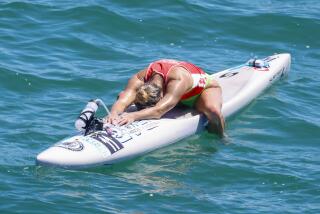Around-the-World Yacht Race Sails on Sea of Commercials
- Share via
WASHINGTON — If all the world is a stage, the Whitbread ‘Round-the-World sailboat race has finally switched the klieg lights on in Earth’s last, great, remote wilderness.
Yachts bearing the logos of beer brewers, cigarette makers, kitchen equipment manufacturers and ladies’ shoemakers are streaking across wild seas these days, risking death and destruction in a quest for market share and corporate recognition.
It presents an interesting ethical puzzle: high sport, but in the name of what?
After two weeks in Punta del Este, Uruguay, observing and chatting up Whitbread voyagers while they rested between legs of their 33,000-mile torture test, I’m still unsure how to rate the event.
On one hand, it’s the grandest sailing imaginable--hurtling around Antarctica in full race rock, flying spinnakers for days on end in 40 knots of wind, surfing down mountainous waves in the dark of night as icebergs whiz by.
“Unbelievable,” marveled a young New Zealander after his maiden Cape Horn rounding. “We had 80 knots (of wind) across the deck; we were knocked down, fighting for our lives for two hours.”
On the other hand, you can’t help noticing the message these folks defy death to deliver. It’s plastered all over the spinnakers and the sides of the boats: “Drink our beer, smoke our cigarettes, get your latest stock quotations from our computerized service.”
Nautical NASCAR, in short, and it’s only just beginning. After 17 years, the Whitbread is finally finding its way into big corporate boardrooms. “Tobacco wars next time,” promised Mike Pavitt of Rothman’s, the British cigarette company’s entry.
Based on his success this time, Pavitt expects at least two fully funded U.S. tobacco entries in the 1993-94 Whitbread from R. J. Reynolds and Philip Morris. Why? Because the race, he said, offers what cigarette makers can’t otherwise buy: Their brand names in the worldwide media, bathed in a positive light.
Rothman’s spent more than $6 million launching and campaigning its maxi-boat, with a fully paid crew and a world-class skipper, former America’s Cup helmsman Lawrie Smith.
And with more than 100 hours of global TV in the books, it was worth every shilling, said Pavitt, chain-smoking his own brand over an elegant lunch at the Yacht Club Punta del Este.
Even though Rothman’s is lurching along in fourth place, the exposure in yachting-mad England, New Zealand and Australia, where Rothman’s sells big, has been thoroughly gratifying, Pavitt said. His company can hardly wait to do it all over again.
Now the Whitbread heads for the first time to the world’s greatest consumer marketplace--the United States--leaving Punta del Este on Saturday for an expected arrival three or four weeks later in Ft. Lauderdale, Fla.
The sailors aren’t exactly clicking their heels at the prospect of head winds up to Rio de Janeiro, then the doldrums before reaching the easterly trade winds in the Caribbean. “The best part of this race is over,” said Dale Tremaine, a paid hand on Fazisi, the first Soviet entry in a transoceanic race.
But for the market-share moguls, the best part is just coming up. They want to see whether free-spending Americans stand and salute when the big racing boats roll over the horizon and up the Florida Gold Coast.
The likelihood of that, by most accounts, is slim. “It’s not unusual for our country to be oblivious to events like this,” said John Marshall, Dennis Conner’s right-hand man in the last four America’s Cups who has just signed on with Italian industrialist Gianni Varasi to help organize a 1993 Whitbread effort.
So why the Whitbread for Marshall? “I think it’s one of the most, maybe the most, challenging and difficult of sailing events,” he said, “and this year it was elevated to the highest levels of intensity and competitiveness.”
Marshall counted off the five boats at the top of the maxi-boat class--Steinlager II, which has won every leg so far; Merit, the Swiss entry; Fisher & Paykel, representing a New Zealand kitchen appliance manufacturer; Rothman’s, and Charles Jourdan, the French sloop.
Big boats, big budgets, big names, big businesses: beer, cigarettes, appliances, women’s apparel. But is this yachting?
“Well, whether by accident or not,” Marshall said, “commercialism came in at the same time the event was elevated to the top levels of competition. And if it takes commercial sponsorship to get the best boats and the best sailors into the most challenging event, I’m all for it.”
All of which puts the Whitbread on a bit of a collision course with its founders, the small, tradition-bound Whitbread brewery in England and the creaky Royal Naval Sailing Assn., which Whitbread assigned to oversee the race from its inception 17 years ago.
Is the Whitbread destined for world-class commercial sporting event status? Not if the founding fathers can help it.
“Oh, no,” said race committee chief Charles Williams, a retired Royal Navy admiral. “The RNSA would never permit itself to be involved in a race where there was something in it--$1 million or something like that--for the winners.
“These fellows (the sailors) are in for the adventure. It’s exciting, dangerous--an Everest expedition. They’re competing for the thrill, the challenge, the endeavor. Money has nothing to do with it.”
Hmmmm . . . .
More to Read
Sign up for The Wild
We’ll help you find the best places to hike, bike and run, as well as the perfect silent spots for meditation and yoga.
You may occasionally receive promotional content from the Los Angeles Times.






